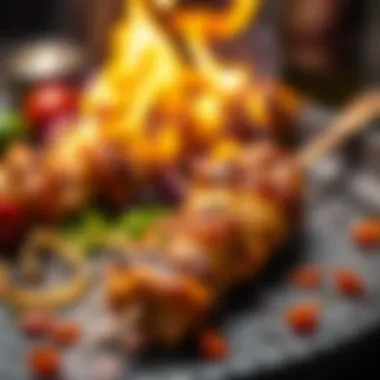Discovering Turkish Cuisine in Dubai: A Detailed Guide


Intro
Dubai, a city famous for its extravagant lifestyle and cultural diversity, serves as a melting pot for culinary experiences. Among these offerings, Turkish cuisine stands out with its rich history and varied flavors. As one wanders through Dubai, the aroma of grilled meats combined with spices often wafts through the air, drawing food lovers into charming establishments that celebrate this vibrant culinary tradition.
Understanding Turkish cuisine is essential, especially in a city like Dubai where many expatriates find a second home. Through an exploration of Turkish dining here, we gain insight into not only the food but also the cultural significance behind each dish. From kebabs to desserts, the menu is a testament to centuries of culinary art, influenced by different regions and cultures.
This guide aims to help you navigate the flavorful landscape of Turkish cuisine in Dubai. It will shed light on the historical context of the dishes, the evolution of recipes that blend traditional and modern influences, and the dining experiences that await you in this vibrant city.
Through a refined lens, we will be diving into the key elements that make Turkish cuisine not just a meal but an experience that resonates deeply with many. So, let's take a closer look at the intriguing world of Turkish gastronomy in Dubai, exploring its significance, the popular dishes that get everyone's taste buds tingling, and the unique ambiance of the Turkish restaurants scattered throughout the city.
Preface to Turkish Cuisine in Dubai
Dubai, a melting pot of cultures, offers a vibrant tapestry of culinary experiences, among which Turkish cuisine holds a prominent place. Its rich historical tapestry woven through centuries of cultural exchanges, Ottoman heritage, and regional flavors shapes the profound culinary identity that resonates in Dubai's dining scene. From taste-bud tantalizing kebabs to delicate baklava, each dish tells a story that connects diners not just to Turkey but to the very essence of hospitality and warmth.
Understanding Turkish cuisine in Dubai isn't merely about food; it’s about exploration. The evolution of Turkish culinary traditions reveals a legacy that has been embraced and adapted by chefs and restaurant owners in this bustling metropolis. How does this culinary heritage unfold in a modern context? This guide serves to illuminate the integral elements that make Turkish dining an experience worthy of exploration, particularly in a diverse city like Dubai.
Culinary Heritage of Turkey
The culinary heritage of Turkey is marked by an interplay of flavors, textures, and aromatic spices. Rooted in ancient civilizations, it reflects a convergence of Mediterranean, Middle Eastern, and Central Asian influences. Typical ingredients, such as spices and herbs, not only enhance dishes but also hold cultural significance.
In traditional Turkish kitchens, the pride of preparation is palpable, with recipes passed through generations. For example, the rich and complex layering of flavors found in dishes like dolma or manti highlight the careful craftsmanship behind the cuisine. Additionally, each region of Turkey contributes distinctive specialties. From the seafood-rich dishes of the Mediterranean coast to the meaty delights of Eastern Anatolia, these regional variations cultivate an expansive culinary landscape that has found a welcoming audience in Dubai.
The Rise of Turkish Restaurants in Dubai
In the past few decades, the culinary landscape of Dubai has witnessed the emergence of numerous Turkish restaurants, each offering a unique experience that celebrates Turkish culture. The success of these establishments can be attributed to several factors.
Firstly, Dubai’s demographic diversity fosters an eager audience for varied cuisines. The curiosity of residents and visitors alike creates a fertile ground for Turkish fare to flourish.
Secondly, the restaurant owners often emphasize the authenticity of their offerings, sourcing ingredients directly from Turkey to maintain originality. Many establishments have also embraced contemporary touches, blending traditional recipes with modern cooking techniques to innovate without losing the essence of authentic flavors.
Thirdly, Turkish cuisine has a natural tendency toward communal dining, encouraging shared experiences that enhance social connections. This communal aspect is particularly appealing in a cosmopolitan setting like Dubai, where cultural exchange thrives.
Significant Turkish Restaurants in Dubai
Turkish cuisine continues to evolve, especially in a cosmopolitan city like Dubai. The significance of exploring the Turkish restaurants in Dubai lies in their ability to intertwine traditional flavors with the local culture. These establishments not only serve as a bridge to Turkish culinary heritage but also cater to the diverse palate of an international audience. Understanding these restaurants provides insight into the broader culinary landscape of Dubai, which is increasingly marked by a fusion of cultures.
Overview of Top Culinary Destinations
In Dubai, it’s hard to miss the aromatic wafts of grilled meats and spices that beckon from numerous Turkish restaurants scattered across the city. The culinary scene is brightened by a variety of dining options, from high-end establishments with sophisticated menus to cozy eateries resonating with the warmth of Turkish culture.
Key Highlights:
- Diverse Offerings: Many Turkish restaurants explore a vast menu, ensuring that everyone finds something they adore.
- Ambiance: The settings range from opulent to rustic, allowing diners to choose an experience that fits their mood.
- Cultural Events: Various restaurants host events that celebrate Turkish food culture, contributing to their popularity.
Restaurant A: A Deep Dive
Ambiance


The ambiance of Restaurant A invites guests into a space that resonates with a Turkish bazaar, richly embellished with traditional art. The warm colors, intricate tile work, and soft lighting create a sense of comfort, making it a perfect choice for a family dinner or a romantic outing. The atmosphere here fosters an engaging dining experience, as guests often find themselves lingering over their meals, enveloped in the surroundings.
Signature Dishes
When it comes to signature dishes, Restaurant A is known for its Adana Kebab. The melding of spices and fresh herbs produces a flavor profile that captures the essence of the region. Another standout is the manti, tiny dumplings bursting with flavor, often served with a garlic yogurt sauce. These offerings not only highlight Turkish gastronomic traditions but also offer a taste of home for expatriates.
Customer Reviews
Customer feedback often highlights the generous portions and authentic flavors, making this restaurant a favorite among enthusiasts of Turkish cuisine. Many patrons rave about the attentive service and welcoming atmosphere, which contribute to the overall dining experience. Yet, some reviews mention the wait time during peak hours, indicating a need for reservations during busy weekends.
Restaurant B: A Deep Dive
Ambiance
Contrast lies at the heart of Restaurant B. It combines modern design with traditional Turkish elements, often capturing the attention of first-time visitors. The spacious layout is punctuated with lush greenery and a tranquil water feature, providing a serene dining experience that feels far removed from the hustle of the Dubai streets. This ambiance aligns well with the restaurant's aim of creating a relaxing retreat for diners.
Signature Dishes
Among its notable dishes, Lahmacun stands out as a favorite. This thin, flavorful pizza topped with minced meat, vegetables, and spices is crafted to perfection. Additionally, the Baklava here is a must-try, flaking delicately with each bite, bringing sweetness that captures the heart of Turkish dessert culture. Such signature dishes affirm the restaurant's commitment to authenticity while catering to contemporary tastes.
Customer Reviews
What patrons appreciate about Restaurant B is its consistency in quality and service. Reviewers often make mention of the welcoming staff and the effort taken to accommodate guests’ preferences. However, it’s worth noting that some diners have remarked that prices may lean a bit higher compared to similar establishments, yet many feel justified due to the quality of the food and experience.
In a city as diverse as Dubai, Turkish restaurants shine not only for their distinct flavors but also for the cultural exchanges they foster.
Navigating through these Turkish culinary hotspots, one gains a deeper understanding of how food serves as a medium of cultural appreciation and community connection in Dubai.
Culinary Features of Turkish Cuisine
Turkish cuisine serves as a vibrant tapestry woven together by centuries of history, culture, and tradition. It's not just about food; it's a reflection of the social gatherings, family relationships, and rituals that define Turkish life. This section endeavors to unravel the essence of Turkish culinary features, steering through vital elements that contribute to its distinctive identity while focusing on the significance it holds in place like Dubai.
Essential Ingredients
At the heart of every Turkish dish lies a medley of ingredients that is both simple and rich. Here are some essential elements that every culinary enthusiast should be familiar with:
- Olive Oil: This golden nectar is the lifeblood of Turkish cooking. It’s not just a cooking medium but a cultural symbol, often drizzled over finished dishes.
- Yogurt: A staple in Turkish cuisine, it's often served alongside kebabs and grilled meats, acting as a cooling contrast to spiced dishes.
- Tahini: Ground sesame paste plays a crucial role in dips like hummus and is sometimes used in salads.
- Sumac: This tangy spice adds a touch of acidity and is frequently sprinkled over salads and grilled meats.
- Fresh Herbs: Parsley, dill, and mint are common in many dishes, providing freshness and complexity.
These ingredients work in concert to create meals that are not only satisfying but also reflective of the climate and landscape of Turkey. They adhere to the principles of freshness and seasonality, which are key tenets of the cuisine.
Typical Cooking Techniques
Understanding Turkish cuisine goes hand-in-hand with getting a grip on its cooking techniques. Many techniques have been handed down through generations, each with its own storytelling nuances:
- Grilling: A hallmark of Turkish cooking; whether it’s kebabs or fish, grilling over charcoal is a method that brings out the intrinsic flavors of the ingredients.
- Slow Cooking: Stews and dishes that simmer for hours are commonplace, allowing the flavors to meld together beautifully. This is often seen in dishes like kuzu tandir, where lamb is cooked until tender.
- Baking: Breads like pide and lavaş are staples and require a dedicated oven or local tandır where the dough gets its unique smoky flavor.
- Stir-frying: Though less traditional, this method is used for making quick meze that are often served as appetizers.
The beauty of these techniques lies in their ability to respect the ingredients, emphasizing their natural flavors rather than overpowering them.


Regional Variations of Dishes
Turkish cuisine is not monolithic; it varies across different regions, influenced by geography, climate, and cultural exchanges. It’s fascinating to explore how the same dish can take on diverse flavors across the country:
- Aegean Region: Known for its olive oil-based dishes, fresh vegetables, and seafood, with a cool herbaceous touch.
- Central Anatolia: More hearty, featuring grain-based dishes and rich stews; Ankara Tava is a notable dish here.
- Southeastern Turkey: Spicy and aromatic, it produces rich meat dishes like Urfa kebab, heavily relying on spices and herbs.
- Eastern Turkey: The use of yogurt is predominant, with dishes reflecting the traditions of neighboring countries such as Iran and Armenia. Kufta is a prime example.
By examining these regional variations, one catches a glimpse of how history and geography shape culinary practices, making each meal a story waiting to be told.
The rich and diverse aspects of Turkish cuisine reveal not just a wealth of flavor, but a deep sense of community and tradition that resonates strongly, especially in places like Dubai where such heritage can unite people from various backgrounds.
The Dining Experience
The concept of dining transcends beyond merely consuming food; it encompasses a rich tapestry of cultural customs, social interactions, and sensory stimulation. This exploration of the dining experience in Turkish cuisine, particularly as it manifests in Dubai, highlights the significance of communal living, rich flavors, and the joy of sharing meals. Here, we will tackle three critical components that shape this experience: cultural aspects, hospitality, and dining etiquette. Each element plays a pivotal role in how Turkish cuisine is perceived and enjoyed, making it an integral part of culinary exploration in Dubai.
Cultural Aspects of Turkish Dining
Dining in Turkey represents a cherished rite bound together by time-honored practices. The first thing to note is that meal times are often viewed as sacred periods, inviting family and friends to bond over shared food. It’s not just about filling one’s stomach; it is about connection. In Dubai’s bustling environment, where individuals often rally around diverse backgrounds, the Turkish dining experience fosters unity.
"In Turkish culture, sharing a meal is akin to sharing one's life; both require trust and openness."
Meals normally commence with an array of meze, or small dishes designed for sharing. This unique approach allows diners to sample various flavors, creating a vibrant palette of taste. The ambiance in restaurants often mirrors Turkish homes, invoking warmth and hospitality. This sociability adds depth, reinforcing the idea that food is not merely sustenance but a vehicle for community.
The Role of Hospitality
One cannot delve into Turkish dining without acknowledging the magnetic pull of hospitality. The Turkish saying, "Misafir umdan gelince, kapıdan girer" (when a guest arrives, they enter through the door), resonates deeply here. It defines a cultural ethos where hosting guests is synonymous with pride and joy. In Dubai, this is seen through the meticulous care displayed by restaurant staff. From the moment a patron steps through the door, they are enveloped in an atmosphere of welcoming.
Servers often engage in conversation, asking about preferences, and guiding guests through the menu. This engagement transforms the meal into an experience rather than a transaction, imbuing it with sincerity. The warmth, reminiscent of family gatherings, is a vital ingredient that elevates the dining experience, making it memorable.
Dining Etiquette
Understanding the nuances of dining etiquette is crucial, especially in the context of Turkish cuisine. Respecting traditions not only enhances one’s experience but also aligns with the expectations of guests in Dubai. For instance, it is customary to wait for the host to begin the meal before others dig in. This small gesture conveys respect.
- Use of hands: While utensils are common, many Turks prefer eating certain dishes with their hands, like bread or kebabs.
- Communal style: Sharing dishes from a larger plate is standard practice, emphasizing collective enjoyment rather than individual portions.
- Respect for elders: Elders often choose what to order or eat first, a reflection of their status in society.
Even simple acts, like saying a polite "Afiyet olsun" (may it be good for you) before diving into a meal, foster a culture of respect and gratitude. Together, these etiquette rules wrap the dining experience in a layer of cultural richness, enhancing appreciation of both food and company.
The intersection of cultural practices, genuine hospitality, and detailed etiquette creates an immersive Turkish dining experience in Dubai. Understanding these elements is essential for anyone wishing to delve deeper into Turkish cuisine while respecting its vibrant framework.
Signature Turkish Dishes to Try
Turkish cuisine offers a rich tapestry of flavors, textures, and traditions that play an essential role in any exploration of dining in Dubai. This section highlights some signature dishes that are not just mere food items but cultural touchstones that reflect a shared heritage. These culinary creations serve as bridges between Turkey's storied past and the modern interpretation of its food. By understanding these dishes, diners can appreciate the broader context of Turkish culture and its adaptation within the vibrant culinary landscape of Dubai.
Kebabs: A Culinary Staple
Kebabs are arguably the backbone of Turkish cuisine. Each city, each region, has its unique version of this iconic dish, shaped by local traditions and available ingredients. In Dubai, kebabs can be found grilled over charcoal in various styles, from the meaty Adana kebab—made from spicy minced lamb—to the tender shish kebab, where marinated chunks of meat take center stage.
The importance of kebabs in both Turkish culture and downtown Dubai cannot be overstated. They are typically served in generous portions with sides of grilled vegetables and fresh bread, making them a popular choice for both locals and expatriates alike. The experience of tearing into a kebab paired with a glass of ayran (a yogurt-based drink) embodies the essence of sociable dining—where sharing and savoring food is paramount.


Baklava: A Dessert Delight
When it comes to sweets, baklava reigns supreme in Turkish culinary tradition. This layered pastry, oozing with honey and filled with finely chopped nuts, illustrates the opulence of Turkish desserts. Each bite offers a flavor explosion, combining the richness of butter, the crunch of nuts, and the subtle sweetness of syrup.
Baklava can be considered more than just a dessert; it represents hospitality within Turkish culture. Offering baklava to guests is a gesture of warmth and generosity. In Dubai, this delightful treat has found its way into many cafés and restaurants, often served alongside espresso or Turkish tea, enhancing the overall dining experience.
Meze: The Art of Sharing
Meze, a medley of small dishes, embodies the communal spirit of dining in Turkish culture. This concept is about more than just food; it's about kinship, conversation, and engagement with flavors. From creamy hummus to spicy muhammara and herbed yogurt, each dish presents an opportunity for guests to partake in a flavorful journey together.
In Dubai, experiencing meze can seem like going on a mini culinary adventure, where diners sample different textures and tastes. The act of sharing these dishes fosters a convivial atmosphere, making it not only a meal but an essential part of social interaction. When dining on meze, every bite can tell a story, enhancing the overall appreciation for Turkish culture.
Pide and Lahmacun: Cultural Comfort Foods
Pide and lahmacun are beloved dishes in Turkish cuisine that can evoke feelings of comfort and nostalgia. Pide, often dubbed as Turkish pizza, consists of flatbread topped with various ingredients like cheese, minced meat, or vegetables. Meanwhile, lahmacun is a thinner flatbread topped with a rich mixture of minced meat, garlic, and spices, then rolled up and enjoyed as a satisfying snack.
These dishes hold a special place in Turkish society, often enjoyed casually with friends or family. In Dubai, they are increasingly popular among those seeking genuine tastes of Turkish comfort food. They not only fill the stomach but also create a connection to the shared meals enjoyed in homes across Turkey.
"Turkish cuisine is not just about eating; it’s about gathering, cherishing traditions, and celebrating life through food."
Exploring these signature dishes enriches the understanding of Turkish culture and its culinary signatures in Dubai. As you take your first bite into a kebab or savor the sweetness of baklava, you engage with a narrative that spans continents and centuries.
Challenges and Opportunities in the Turkish Restaurant Scene
The Turkish restaurant scene in Dubai is a colorful tapestry woven from rich culinary traditions and contemporary influences. Navigating through this landscape, we uncover not only the difficulties faced by restaurant owners but also the road to numerous opportunities. Understanding these elements is crucial, especially for those who have a vested interest in the dynamics of Dubai’s effervescent food market.
Market Competition
In Dubai, competition within the Turkish restaurant sector is nothing short of fierce. With numerous establishments vying for attention, distinguishing oneself is paramount. Each restaurant must not only uphold the essence of Turkish cuisine but also cater to the evolving preferences of diners, many of whom are familiar with global culinary trends.
Here are a few thoughts on the competitive landscape:
- Diverse Offerings: Restaurants are increasingly drawing from distinct regional specialties. Not just limited to kebabs and baklava, establishments like Karam Beirut showcase unique dishes, setting themselves apart by focusing on local adaptation of Turkish classics.
- Quality and Authenticity: With a multitude of options, customers are demanding more than just good food; they seek authenticity. Restaurants that manage to bring genuine Turkish flavors to the table, akin to those found in Istanbul, are often favored.
- Location: Proximity to popular areas and amenities influences foot traffic. Strategic locations, such as Al Karama or Downtown Dubai, create added exposure and can significantly impact sales.
The End and Future of Turkish Restaurants in Dubai
The exploration of Turkish cuisine in Dubai serves as a mirror reflecting not just culinary tastes, but also the diverse cultural landscape of the city. With a firm grounding in traditional practices, Turkish restaurants in Dubai have consistently offered a taste of authenticity while adapting to the local preferences. This conclusion extracts and synthesizes the insights obtained throughout this article, focusing on the ongoing evolution, challenges, and bright future that lie ahead for this vibrant culinary scene.
Summation of Insights
In tangling with the rich and complex threads that make up Turkish cuisine in Dubai, several pivotal aspects have emerged. Firstly, the historical context of Turkish food is often filled with tales of migration and globalization, as flavors traveled across regions and blended with local ingredients. Secondly, the influence of local culture on Turkish dining is paramount. Restaurants do not merely serve dishes; they create experiences that resonate with local customs, reflecting a unique amalgamation of Turkish tradition and Emirati lifestyle.
Furthermore, customers have increasingly shown a proclivity for places where authenticity meets modernity. The ambient setting, hospitable staff, and presentation of dishes play a significant role in attracting a clientele that values both taste and the overall dining atmosphere. Customers have begun to expect not just meals, but memories etched into their minds through storytelling conveyed via food. To phrase it simply, the restaurant scene thrives when it balances heritage with contemporary flair.
Looking Ahead: Trends to Watch
The future of Turkish restaurants in Dubai intrigues culinary experts, restaurateurs, and food enthusiasts alike. There are several trends that are shaping this vibrant sector.
- Health-Conscious Offerings: As awareness about health increases, diners are leaning towards healthier options. Restaurants are beginning to promote dishes with lean proteins, fresh vegetables, and alternative grains. We can expect more organic, locally-sourced ingredients to make their way onto the menus.
- Fusion Cuisine: As cross-cultural interactions burgeon, fusion flavors incorporating Emirati, Asian, or Mediterranean touches to Turkish dishes could become a talking point in many establishments.
- Sustainability Practices: An emerging trend is the focus on sustainability, with many restaurants adopting practices that reduce food waste and emphasize renewable sources. While traditional Turkish cuisine often relies on shared dishes, a renewed emphasis on reducing single-use plastics and sourcing local produce could gain traction.
- Technological Integration: Lastly, the integration of technology within dining experiences is set to grow, whether through online reservations, food delivery apps, or digital menus. The rise of tech-savvy consumers will encourage restaurant owners to invest in innovations that enhance customer engagement.
"The power of adaptability will define the landscape of Turkish restaurants in Dubai for years to come."
In closing, as the demands of consumers shift and the culinary scene continues to evolve, Turkish restaurants in Dubai are poised to not only maintain their roots but also flourish by embracing the fresh currents of change. Their capacity to adapt will be crucial in catering to both visitors and residents who crave authentic yet innovative dining experiences.



